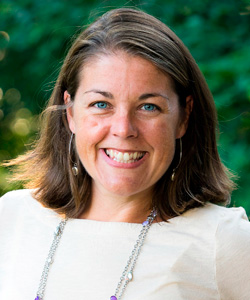
Our service is synonymous with the needs in our world.
~ Angie Moloney
Living the Magis — Q&A with Angie Moloney of the Jesuit Volunteer Corps
Dare to change: This call to action encapsulates the Jesuit Volunteer Corps’ (JVC) revolutionary model of faith-based service. As director of JVC’s domestic program, Angie Moloney joins young volunteers on their journeys of change, using Ignatian spirituality to deepen how they and those they serve engage with JVC’s four pillars: spirituality, simple living, community, and social justice.
HOW DID YOU COME TO JVC?
I always wanted to be a Jesuit Volunteer, but I took a unique path. I earned an M.A. in theology from Washington Theological Union and served as the director of campus ministry at a Catholic high school in the D.C. area. My husband and I moved to West Virginia to volunteer with a community called Nazareth Farm, leading service retreats for youth and young adults. When I was looking to transition out of the community, a good friend suggested JVC. I started in 2007 and was the executive director of JVC Midwest in Detroit. Now I’m director of the domestic program.
WHAT TYPES OF SERVICE DO JESUIT VOLUNTEERS ENGAGE IN?
Our service is synonymous with the needs in our world, whether that’s addiction and recovery work; community development and organization; working with people who are hungry; immigration advocacy and refugee services; legal services and health care; or children and youth services.
WHAT QUALITIES SHOULD A JESUIT VOLUNTEER HAVE?
We’re looking for people who are courageous in a way that is different than the world may think of courage. People who are willing to ask challenging questions and hear challenging responses, who have experience getting their hands dirty and in serving and being with others. We’re looking for people who are flexible and fun.
HOW DO JESUIT VOLUNTEERS IMPLEMENT JVC’S VALUES INTO THEIR LIVES?
|
|
About JVC |
| 37 | U.S. cities with JVC sites |
| 230 | Jesuit Volunteers serving in the United States |
Similar to the Paschal Mystery, we’re working in a world where Christ is born into brokenness. Rather than running from that brokenness, we invite our volunteers to embrace it. Being with others will help them be more hopeful and change our world to be a more hopeful and just place. That’s really counter-cultural. It’s different than what they’re hearing on TV, what they’re reading on Facebook, what their friends are talking about. When we invite them to put relationships first, that’s a challenge, because many young people have been raised in a world that doesn’t put people first. We really take the world and, in a way, turn it upside down.
COULD YOU TELL US ABOUT A WORK SITE THAT EMBODIES JVC’S MISSION?
Pope Francis speaks a lot about encountering Christ in one another, and at the Pope Francis Center in Detroit, our volunteer has the opportunity to simply be with others in their brokenness. She works with people experiencing homelessness and loves those who others have a hard time loving.
WHAT DO YOU HOPE FORMER JESUIT VOLUNTEERS TAKE FROM THE PROGRAM?
I hope JVC is a platform by which former volunteers can live the rest of their lives. Our program’s four values aren’t for a year; they’re four values for how you should live in the world, being in community with your neighbors, your parish, and with people who are different, serving people around you, always being attentive and mindful of social justice in your world, and looking out for people who others have a tendency to overlook. JVC is a program that teaches and trains young adults to be Jesuit leaders in our world.
To learn more about JVC, visit www.jesuitvolunteers.org
Click here for the Summer 2016 Jesuits magazine index.